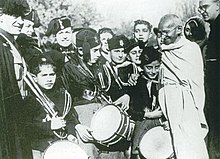India–Italy relations
Historically, trade and cultural ties dates back to the era of the Roman Empire and Ancient India.
[3] During the British Raj, trade and travel between India and Italy reduced significantly due to prevailing political conditions.
[5[broken anchor]] Fascist Italy under Benito Mussolini maintained friendly ties with Indian nationalist leaders Mahatma Gandhi and Subhas Chandra Bose,[5] and Mussolini expressed genuine support for Indian independence during the 1930s and 1940s, though it at first remained sceptical that Bose's efforts would receive significant support from its ally, Nazi Germany.
[6] In May 1942, Italy advocated for the Tripartite Pact to formally endorse Indian independence, though this was vetoed at the time by Germany.
[9] In 1943, Italy, Germany and six other Axis states formally recognised the Bose-led Azad Hind as the government of India.
The 4th, 8th and 10th Divisions and 43rd Gurkha Infantry Brigade led the advance, notably at the gruelling Battle of Monte Cassino.
Indian Prime Minister Manmohan Singh visited Italy to attend the 35th G8 summit at L'Aquila in July 2009.
[12] After some years of tensions due to the case of the two Italian marines accused of killing two fishermen off the coast of Kerala, the two countries revived normal relations thanks to Prime Ministers Paolo Gentiloni and Narendra Modi.
[16] On November 29, 2017, India and Italy signed a memorandum of understanding (MoU) for enhancing bilateral cooperation in the health sector.
Activities to be carried out under the scope of this MoU include exchange and training of doctors, setting up of health care facilities and promotion of business development opportunities in pharmaceuticals.


